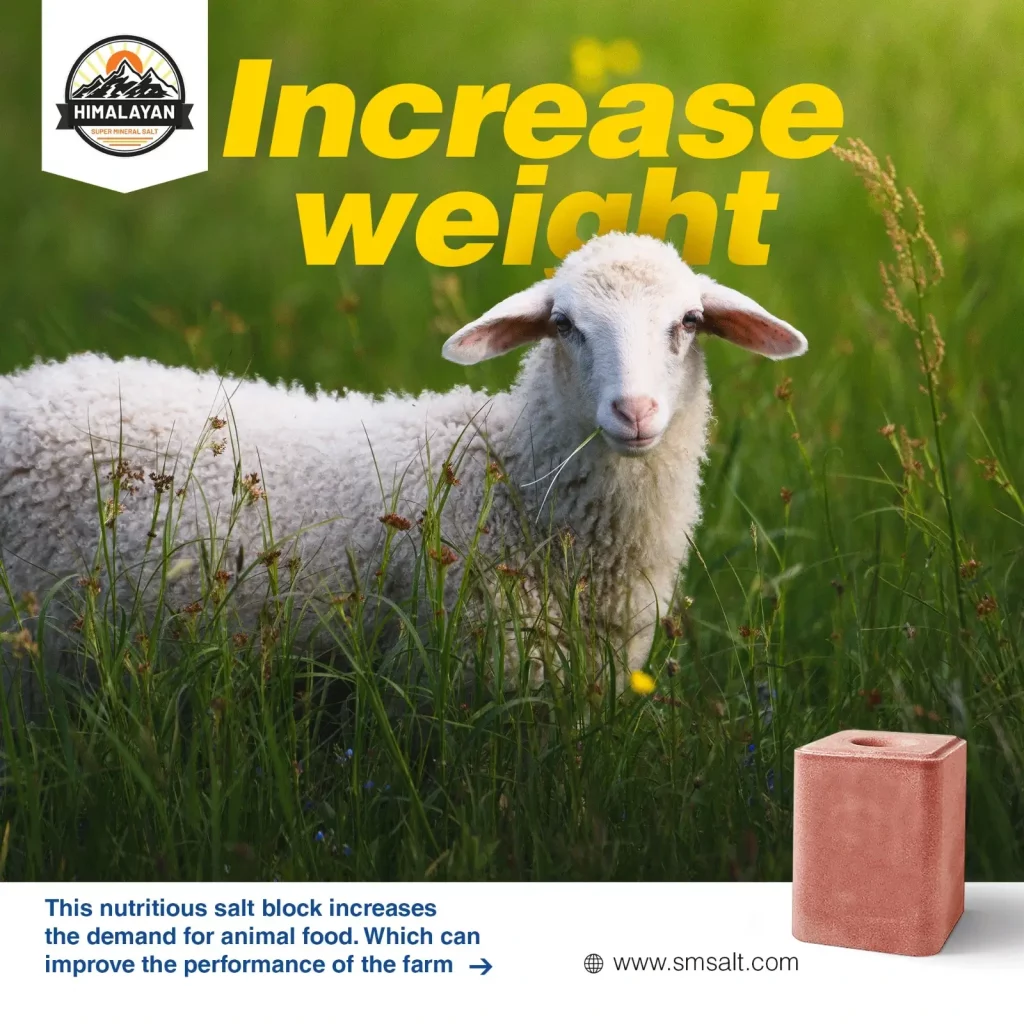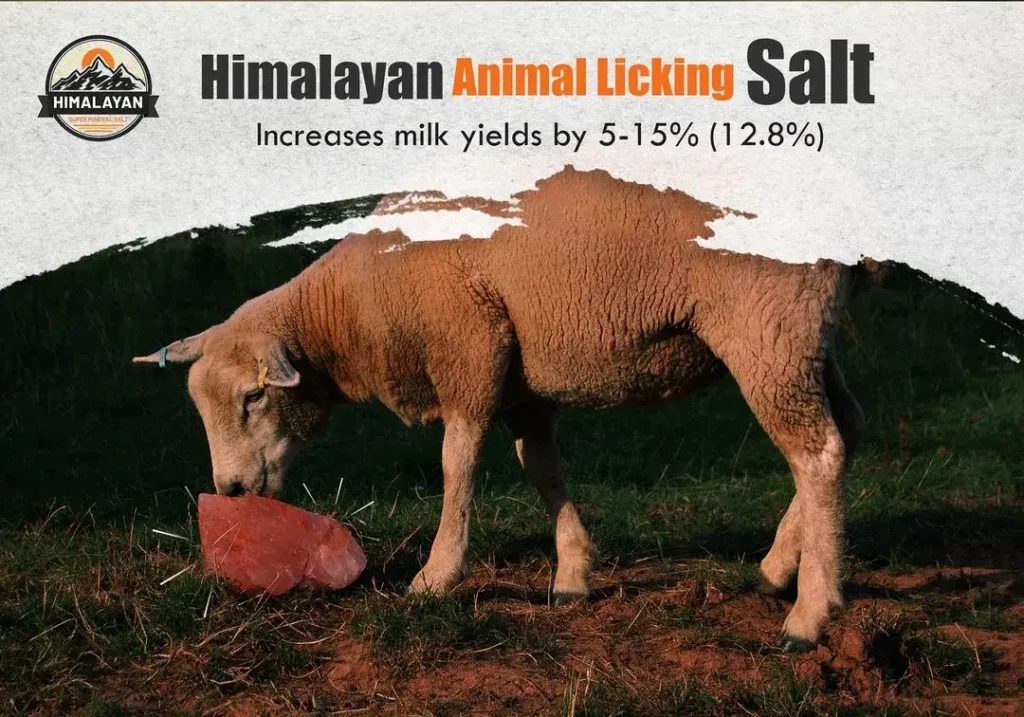In this blog post, we will discuss the Himalayan mineral block for goats and sheep. If you are a livestock owner, you understand that providing the proper amount of nutrition to your animals is very important for their overall health and well-being. One simple way to supplement their diet is by using mineral blocks, which are intended to provide important minerals and trace elements that might be missing in their feed.

The Himalayan mineral block is a common and popular choice among farmers and ranchers because of its unique composition and outstanding health benefits. Throughout this blog, we will explore the benefits of using Himalayan mineral blocks for goats and sheep, how they work, and how to effectively use them to support the nutritional needs of your animals.
Mineral Block For Goats And Sheep
Mineral blocks are a significant part of a balanced diet for goats and sheep. They have important minerals and trace elements. These minerals are necessary for the health and well-being of the animals, and a lack of them could lead to health issues like reduced milk production, reduced fertility, and weakened immune systems.
What Is A Mineral Block?
A solid block of minerals that is compressed into a convenient form for simple feeding is called a mineral block. They are designed to be licked or bitten by the animal, enabling them to absorb the minerals they require. Mineral blocks are often made from salt, which is an important mineral that all animals require. However, they could as well contain other minerals like calcium, phosphorus, zinc, and copper.
Why Do Goats And Sheep Need Mineral Blocks?
Goats and sheep need a stable diet that has all of the important minerals and trace elements they need in order to remain healthy. These minerals are important for a vast range of bodily functions, like bone growth, milk production, and immune function. If these minerals are lacking in their diet, it could lead to health issues like weak bones, bad milk production, and weakened immune systems.
In addition to that, goats and sheep are often raised in areas where the soil is lacking in certain minerals. This could make it tough for the animals to get sufficient of these essential minerals from their diet alone. Mineral blocks are a simple way to supplement their diet and make sure that they are getting all of the important minerals they need.
What Are The Benefits Of Using Mineral Blocks?
Mineral blocks offer a lot of benefits for goats and sheep, including:
Improved Health And Well-being – By providing significant minerals and trace elements, mineral blocks can help keep goats and sheep remain healthy and happy. This could lead to improved productivity.
Convenience – Mineral blocks are simple to use and need less effort on the part of the farmer. They could be left in the pasture or barn for the animals to access as required.
Cost-effective – Mineral blocks are a reasonable way to supplement the diet of goats and sheep. They last for a long time and could be used by numerous animals.
Reduced Risk Of Mineral Deficiencies – By giving a constant source of essential minerals, mineral blocks could help avoid mineral deficiencies in goats and sheep. This could lead to better health.

What Are Himalayan Mineral Blocks?
Himalayan mineral blocks are a kind of mineral block that is made from Himalayan rock salt. This salt is crafted from ancient salt mines in the Himalayan mountains of Pakistan. The salt is then compressed into a solid block that is appropriate for feeding goats and sheep.
What Minerals Do Himalayan Mineral Blocks Contain?
Himalayan mineral blocks contain a vast variety of essential minerals and trace elements, that includes:
- Sodium
- Calcium
- Magnesium
- Potassium
- Iron
- Zinc
- Copper
These minerals are all important for the health and well-being of goats and sheep. By giving them in a convenient and easily available form, Himalayan mineral blocks could help make sure that your animals are getting all of the essential minerals they require.
How To Use Himalayan Mineral Blocks?
Himalayan mineral blocks are very simple to use. Just place the block in an area where the animals can access it, like in the pasture or barn. The animals will lick or bite the mineral block as needed to penetrate the minerals. It’s necessary to make sure that the block is kept dry and clean, as moisture can cause it to break down more often.
It’s as well important to note that while mineral blocks are an amazing way to supplement the diet of goats and sheep, they must not be depended upon as the sole source of minerals. It’s still significant to provide a balanced diet that includes a range of forages and feeds.
If you want to purchase Himalayan mineral blocks for your farm animals, SM SALT would be your best option. We are a leading manufacturer, exporter, and supplier of Himalayan pink salt products in bulk worldwide. Our mineral blocks are made from 100% natural Himalayan pink salt and have all of the important minerals and trace elements that your animals need in order to stay healthy and happy.
In addition to mineral blocks, SM SALT as well provides a vast variety of other Himalayan pink salt products that can be beneficial for both animals and humans. Our products include salt licks, salt lamps, bath salts, candle holders, and a lot more. All of our products are made from premium quality Himalayan salt and are accessible in bulk at competitive prices.
So, whether you’re a farmer, rancher, or just somebody who wants to improve the health and well-being of your animals, SM SALT’s Himalayan mineral blocks and other salt products will be your best option to consider. We are a trusted and reliable supplier that has been providing the highest Himalayan pink salt quality products to customers worldwide for many years.
So, don’t hesitate to contact us today at info@smsalt.com to learn more about our products and how we can benefit your animals.
